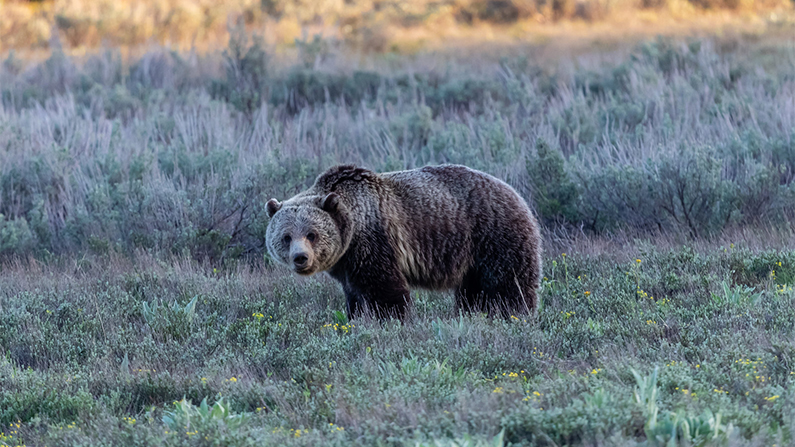Wyoming Gov. Mark Gordon submitted a petition Monday to the U.S. Fish and Wildlife Service to remove the Greater Yellowstone Ecosytem’s population of grizzly bears from the Endangered Species List.
The move follows a similar petition filed by Montana last month. Wyoming, Montana and Idaho also amended a Tri-State Memorandum of Agreement (MOA) on grizzly bear management in November to address past court concerns about delisting the species. The changes include committing to adjusting annual management targets and mortality thresholds as population estimates change and agreeing to bring in new bears as needed in order to augment genetic diversity of the population.
“This is a natural step in the evolution of conservation of grizzly bears,” said Wyoming Game and Fish Department Supervisor of the Large Carnivore Section Dan Thompson, speaking to KHOL after the MOA was updated. Thompson added that federal delisting would not strip protections from the bears.
“It would not change the fact that we have to demonstrate [that] that population has recovered into perpetuity,” he said. “What it would do is it would allow us to have management authority over the population and, quite honestly, not have to call the Fish and Wildlife Service to get permission to conduct management activities within our jurisdiction.”
Opponents to removing federal protections of grizzlies, a group that includes many environmental organizations, wildlife professionals and Indigenous communities across the Greater Yellowstone Ecosystem, have described the Montana petition as a “political power grab” and warned that science-based wildlife management in the state has been replaced by “anti-predator hysteria fueled by misinformation and emotion.” Andrea Zaccardi, a senior attorney at the Center for Biological Diversity, also called Wyoming’s petition an “outrageous request” in a Tuesday statement, saying, “There is no science to back the claim that grizzlies no longer need protection.”
Thompson addressed such opposition in his interview with KHOL.
“Some of it is a belief system that grizzly bears should never be delisted and, I guess to me, that’s an affront to the notions of the Endangered Species Act,” he said. “The goal of that act, which is a very powerful act, is to provide the protection needed to bring a population or a species back from the brink, and it’s done a very good job of that with grizzly bears. But you also have to move beyond that.”
Wyoming’s petition argues that the Greater Yellowstone grizzly bear population has been biologically recovered since the early 2000s, meaning it should be considered separately from other grizzly populations in the lower-48 states and no longer listed as “threatened.”
The Fish and Wildlife Service agreed that grizzly bear populations in the Northern Continental Divide and Greater Yellowstone ecosystems are biologically recovered in March 2021, upon completion of a five-year status review of the species. However, the agency did not recommend a change to its protected status due to other challenges faced by the species, including “limited habitat connectivity, management of access by motorized vehicles, human-caused mortality and uncertainty surrounding future conservation efforts in some ecosystems.”
The Fish and Wildlife Service has 90 days to review the petitions from Wyoming and Montana. Gov. Gordon said he’s “optimistic the Service will view the petition favorably.”
“Grizzly bears in the GYE are fully recovered and their management is now best entrusted to the experienced and capable institutions of the states,” Gordon said. “The GYE grizzly bear is ready to join the ranks of the bald eagle, American alligator, peregrine falcon and brown pelican as receiving proper recognition as a thriving, recovered and stable species.”






